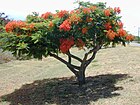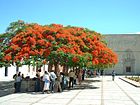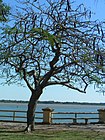Note: This is a project under development. The articles on this wiki are just being initiated and broadly incomplete. You can Help creating new pages.
Difference between revisions of "Delonix regia"
| Line 76: | Line 76: | ||
==External Links== | ==External Links== | ||
| − | * [ ] | + | * [http://www.flowersofindia.net/catalog/slides/Gulmohar.html Delonix regia on flowersofindia.net] |
| − | * [ ] | + | * [https://keyserver.lucidcentral.org/weeds/data/media/Html/delonix_regia.htm Delonix regia on lucidcentral.org] |
| − | + | ||
[[Category:Herbs]] | [[Category:Herbs]] | ||
[[Category:Pages without herbs images]] | [[Category:Pages without herbs images]] | ||
Revision as of 10:25, 24 April 2020
Delonix regia is a fast-growing tree with an umbrella shaped, spreading crown with the long, nearly horizontal branches forming a diameter that is wider than the tree’s height. The tree grows upto 10 - 18 metres tall.
Contents
- 1 Uses
- 2 Parts Used
- 3 Chemical Composition
- 4 Common names
- 5 Properties
- 6 Habit
- 7 Identification
- 8 List of Ayurvedic medicine in which the herb is used
- 9 Where to get the saplings
- 10 Mode of Propagation
- 11 How to plant/cultivate
- 12 Commonly seen growing in areas
- 13 Photo Gallery
- 14 References
- 15 External Links
Uses
Constipation, Inflammation, Rheumatoid arthritis, Diabetes, Pneumonia, Malaria.
Parts Used
Chemical Composition
The active compounds include flavonoids, alkaloids, saponins, sterols, beta-sitosterol, lupeol, tannins, carotenoids, and phenolic acids.[1]
Common names
| Language | Common name |
|---|---|
| Kannada | |
| Hindi | |
| Malayalam | |
| Tamil | |
| Telugu | |
| Marathi | |
| Gujarathi | |
| Punjabi | |
| Kashmiri | |
| Sanskrit | |
| English |
Properties
Reference: Dravya - Substance, Rasa - Taste, Guna - Qualities, Veerya - Potency, Vipaka - Post-digesion effect, Karma - Pharmacological activity, Prabhava - Therepeutics.
Dravya
Rasa
Guna
Veerya
Vipaka
Karma
Prabhava
Habit
Identification
Leaf
| Kind | Shape | Feature |
|---|---|---|
Flower
| Type | Size | Color and composition | Stamen | More information |
|---|---|---|---|---|
| {{{5}}} |
Fruit
| Type | Size | Mass | Appearance | Seeds | More information |
|---|---|---|---|---|---|
Other features
List of Ayurvedic medicine in which the herb is used
Where to get the saplings
Mode of Propagation
How to plant/cultivate
A plant of low to medium elevations in the moist tropics, being found at elevations from sea level to 2,000 metres.[3]
Commonly seen growing in areas
Photo Gallery
References
- ↑ [Chemistry]
- ↑ [Morphology]
- ↑ Cultivation
Cite error: <ref> tag with name "Uses" defined in <references> is not used in prior text.
External Links
- Pages with reference errors
- Ayurvedic Herbs known to be helpful to treat Constipation
- Ayurvedic Herbs known to be helpful to treat Inflammation
- Ayurvedic Herbs known to be helpful to treat Rheumatoid arthritis
- Ayurvedic Herbs known to be helpful to treat Diabetes
- Ayurvedic Herbs known to be helpful to treat Pneumonia
- Ayurvedic Herbs known to be helpful to treat Malaria
- Herbs with Seedpod used in medicine
- Habit - Evergreen tree
- Index of Plants which can be propagated by Seeds
- Herbs that are commonly seen in the region of Forests in warm humid areas
- Herbs
- Pages without herbs images




